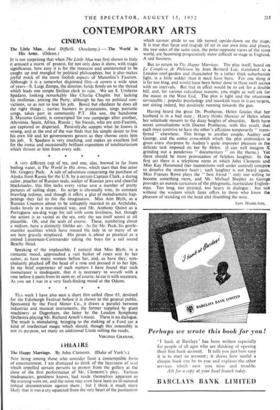CONTEMPORARY ARTS
CINEMA
The Little Man. Anni Difficili. (Academy.)—The World in His Arms. (Odeon.) Ir is not surprising that when The Little Man was first shown in Italy it aroused a storm of protest, for not only does it show, with tragic significance, how easy it is for the innocent and uninterested to be caught up and mangled by political philosophies, but it also makes joyful mock of the more foolish aspects of Mussolini's Fascism. Although it is a somewhat disjointed film—it covers a wide span of years—S. Luigi Zampa, the director, holds firmly on to the thread which leads one simple Sicilian clerk to ruin. We see S. Umberto Spadaro, looking remarkably like Charlie Chaplin but lacking his resilience, joining the Party, although he has no political con- victions, so as not to lose his job. Bored but obedient he does all the right things ; carries banners in processions, sings patriotic songs, takes part in community P.T. His son, the handsome S. Massimo Girotti, is conscripted for one campaign after another, Abyssinia, Spain, Africa, Russia ; his friends, who are anti-Fascists, are captured or dispersed. Passively ke accepts what he knows is wrong, and at the end of the war finds that his simple desire to live his own life and let governments govern as they choose costs him his job. S. Spadaro is very touching, and makes an excellent foil for the, ironic and occasionally brilliant exposition of totalitarianism which thrusts at him from every side.
-* *
A very different cup of tea, and one, alas, brewed in far from boiling water, is The World in His Arms, which stars that fine actor Mr. Gregory Peck. A tale of adventure concerning the purchase of Alaska from Russia for the U.S. by a certain Captain Clark, a daring sailor, poacher of Russian seals, socker of Russian jaws and cheerful blackmailer, this film lacks every virtue save a number of pretty pictures of sailing ships. Its script is abysmally trite, its constant brawling tedious, and though it offers a glut of melodramatic hap- penings they fail to fire the imagination. Miss Ann Blyth, as a Russian Countess about to be unhappily married to an Archduke, looks -lovely in a tear-stained way, and Mr. Anthony Quinn as a Portuguese sea-dog wags his tail with some liveliness, but, though the action is as varied as the sea, only the sea itself seem i at all plausible. Oh, and the seals of course. These, numbering about a million, have a distinctly lifelike air. As for Mr. Peck, his gentle- manlike qualities which have roused the lady in so many of us are here gravely misplaced. His pirate is. about as piratical as a retired Lieutenant-Commander taking the boys for a sail round Ileachy Head.
Speaking of the implausible, I noticed that Miss Blyth, in a romantic mood, approached a vast basket of roses sent by her suitor, as have many women before her, and, as have they, non- chalantly plucked off the head of a rose and pressed it to her lips. In my brief experience of such matters I have found that such insouciance is inadequate, that it is necessary to wrestle with a rose before it parts from its stem or, of course, to cut it with secateurs. As you see I was in a very fault-finding mood at the Odeon.
This week I have also seen a short film called Opus 65, destined for the Edinburgh Festival before it is shown to the general public. Sponsored by the Ford Motor Co., it draws a parallel between industrial and musical instruments, the former supplied by giant machinery at Dagenham, the latter by the London Symphony Orchestra playing Mr. Richard Arnell's music. There is no dialogue. The result is stimulating, bringing to the making of a Ford car a kind of intellectual magic which should, though this ostensibly is not its purpose, set many an additional Lizzie rolling the roads.
VIRGINIA GRAHAM.


























 Previous page
Previous page